Maternal and Child Health
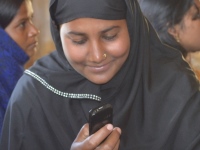
What is the need
It is a paradox that statistics of any ANC coverage shows an increase from 51% to 56%, TT injections from 48% to 55% and IFA tablets from 12% to 19% however, despite the improvement in figures, Jharkhand has been subjected to poor quality of maternal health situation and services. There is very less awareness about institutional delivery and about 80% of total deliveries happen at homes in rural areas where they lack even basic sanitation. Due to higher presence of forest and lack of sanitation cases of malaria are also very high in Jharkhand affecting the health of mother and child.
As per the statistics of AHS 2010-11, MMR of Jharkhand is 261 and that of Ranchi is 294 per 100000 live births. Usually, pregnant women and lactating mothers belonging to poor and marginalised community are most affected.
Approach and achievements
NBJK with the support of CEDPA, formed a cohort of 500 pregnant women and lactating mothers was formed, specifically targeting towards women in their 2nd and 3rd trimester and postpartum period that receive antenatal, natal and post natal services from public and private facilities in the operational areas. To achieve its goals, two major strategies have been adopted, first, to generate awareness on maternal health entitlements through mobilizing the cohort (beneficiaries) to effectively use mobile technology (swasthya vaani) for enhancing their knowledge and understanding. Secondly, to track women who receive maternal health services from public and private facilities and feeding back their experience using swasthya vaani toll free number.
This project has made use of mobile phones/technology to spread awareness on maternal health services among the community and to help women provide their feedback on experiences visiting a facility/hospital. The use of mobile technology in this project is completely new to the community. However, it is enjoyed by the larger part of the community. Thanks to “Swasthya Vaani”, which has made it easier and simpler for women to stay back home and yet have access to information on maternal health services from anywhere and anytime.
It is outstanding to see the numerous feedbacks received from cohort as well as non-cohort every day. These feedbacks include their experiences (good and bad) on attending a facility during ANC, delivery, PNC. With this project, we have been able to reach many other women outside cohort, who feel motivated to provide their feedback.
In the year 2013, with the support of London School of Hygiene and Tropical Medicine, survey of pregnant women and lactating mothers to find the prevalence of malaria. Survey of 671 such women was done and they were observed during ANC/PNC check-ups at government health centres.
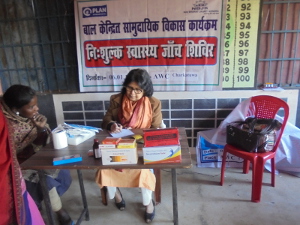 Here we would like to mention voluntary and specialized services by noted gynaecologist Dr. (Mrs.) Ranjana Sharan from Hazaribag who has been supporting our village health camps in Churchu block (District-Hazaribag) since the year 2016 and catered about 5000 rural women in the stages like before / during pregnancy or after delivery. She ensures check up of pregnant women, specially their nutritional deficiency, counsel them over birth spacing, contraceptives, lactation, breastfeeding and took special care by examining their blood pressure, anemia, urine etc. through anti-natal period. Dr. (Mrs.) Sharan helped a number of women for anemia correction and encouraged them for institutional delivery. She conducted anti-natal classes, distributed iron tablets, IUCD and promoted an awareness drive upon maternal & child health across remote villages.
Here we would like to mention voluntary and specialized services by noted gynaecologist Dr. (Mrs.) Ranjana Sharan from Hazaribag who has been supporting our village health camps in Churchu block (District-Hazaribag) since the year 2016 and catered about 5000 rural women in the stages like before / during pregnancy or after delivery. She ensures check up of pregnant women, specially their nutritional deficiency, counsel them over birth spacing, contraceptives, lactation, breastfeeding and took special care by examining their blood pressure, anemia, urine etc. through anti-natal period. Dr. (Mrs.) Sharan helped a number of women for anemia correction and encouraged them for institutional delivery. She conducted anti-natal classes, distributed iron tablets, IUCD and promoted an awareness drive upon maternal & child health across remote villages.
Still much to do…
MMR of Jharkhand is 261. Women of poor and marginalised community are most affected.
About 80% of delivery in Jharkhand happens at home in rural areas where they lack even basic sanitation facility.
WASH
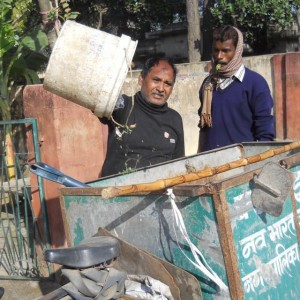
- Rapid urbanization and concentration of people without adequate civic facilities has resulted as slum areas in Ranchi where safe drinking water, sanitation and hygiene coverage are needed to fulfill essential requirements for inhabitants. NBJK took their cause and ensured access of such fundamental services for them in 32 slums of Ranchi district where there is no choice but to live anyhow.
- Under WASH project, it encouraged community participation through awareness, capacity building and advocacy. The people were provided low-cost technological tools and facilitated to learn improved hygienic behaviors like use of toilets, hand washing with soap, handling of drinking water and sanitary practices during menstruation.
- This intervention has helped slum dwellers to transform their lives qualitatively with a changed mindset. WASH reached to 2528 people in slums of Ranchi with support of Water Aid, UK.
What is the need?
Ranchi is the capital city of Jharkhand. Rapid urbanization and migration from other districts in search of work has resulted in slums. Most slums lack basic civic amenities like proper roads, drainage, safe drinking water supplies and toilet facilities. During the visits in slums it has been noticed that:
- Over 90% of hand-pumps of slums provide water with high fecal contain making it unfit for drinking, but people have no other choice
- 50% of the schools do not have proper toilets and drinking water facility. Girls have to face most problems for toilets
- 50% of households do not have toilets. Most of the people are practicing open defecation. Person with disabilities are not able to access the toilet.
- Practices of washing hand with ash or soil is popular in slums
- In absence of proper drainage system and soak-pits, the condition of slums becomes pathetic with drain water flowing all over roads.
- Awareness on menstrual hygiene management (MHM) is very poor among adolescent girls.
Due to these the slums are extremely affected with high incidence rate of disease like malaria, typhoid, diarrhoea, jaundice, etc.
There is a need community sensitization leading to a “demand driven “not “target oriented”, and a “community led” not “construction oriented” approaches.
Our Approach and Achievements
NBJK with is presence in Ranchi for over 20 years has very good rapport in the slums and cities. NBJK with the support of ICEF and Ranchi Municipal has earlier implemented Solid Waste Management Programme covering over 90,000 Households door to door every day. NBJK has helped Ranchi Municipal to design its first Solid Waste Management guideline.
With the kind support of WaterAid, NBJK with the aim of generating demand for services and facilities through community based organisations to mobilise investment in Water and Sanitation for Urban Poor, started Water Sanitation and Hygiene (WASH) programme.
Slum Development Committees are formed in slums and with whose assistance individual toilets soakage pits, vermin compost pits, doorstep waste collection system by containerized trolleys, drainage construction, placement of water containers, repairs of hand pumps, water testing, and new hand pumps have been created and made functional. Assistance of Ranchi Municipal Corporation to this noble cause has been significant.
Adolescent groups are formed in slums to educate them about Menstrual Hygiene Management. Empowerment of Urban Local Bodies, Slum Action Networks and Slum Development Committees are done on government schemes and services and for demand raising.
Last year with the kind support of WaterAid, 100ft drain, 2 school toilets, 3 water tanks at schools were constructed. 500 girls were informed about MHM in 50 groups and 3000 families were reached at explained about sanitation, safe water storing practices. 10 soakpits were constructed. All these activities were done in 32 slums of Ranchi, Jharkhand.
- Still much to do…
- About 34% of the total population of the Ranchi City lives in Slums
- Ranchi Municipality has reached only to 3% of the population of slums for some activities.
General Health
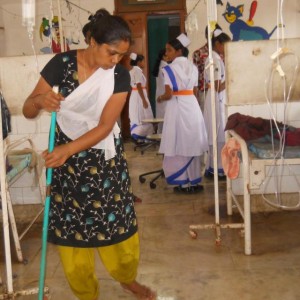
About 50% of total population of Bihar and Jharkhand states on India lives below poverty line. These people are unable to visit doctors for health checkups. This has resulted in high maternal mortality rate, high infant mortality rate, high number of deaths due to disease which are curable like malaria, TB and diarrhoea. Government has Primay Health Centre and Hospitals at district level, but the status of these hospitals are pity.
NBJK has initiated at small scale to make the health services affordable and reachable by improved management of resources and community action with Jeevan Jyoti Health Clinic (JJHC) with the support of Thiess Minecs India Pvt. Ltd. supports JJHC under its CSR activities.
JJHC has treated 11,107 patients during last one year and 100 people received cataract surgery through 7 eye screening camps held here.
What is the need?
Sound healthy status is basic requirement of an individual. Jharkhand and Bihar states of India have common issues of high poverty, high infant mortality, low immunization of children and expectant mothers, high mortality due to infectious and contagious diseases, high maternal mortality, and low institutional delivery. These coupled with poor accessibility to health care facilities and high costs of treatment have made all achievements in health sector insignificant.
Despite the National Rural Health Mission (NRHM) and Government’s commitment to improve the availability of and access to quality health care by people, the improvement in public health care services has not shown improvement.
The main barriers are physical, financial, social and informational. Poor transportation facilities and lack of health infrastructures further worsens health care facilities and services.
Our Approach and Achievements
NBJK is one of the most renowned organisations of Bihar and Jharkhand states of India, working for past 43 years at the grassroot level.
People’s health and wellbeing is considered as one of the major indicators for development. In Jharkhand, a sizeable share of population remains deprived of basic health care facilities. The issues of availability, accessibility, acceptability, affordability and quality with regard to health care remain as serious concerns.
NBJK has initiated at small scale to make the health services affordable and reachable by improved management of resources and community action with Jeevan Jyoti Health Clinic (JJHC) in Barkagaon block of Hazaribag district with the support of Thiess Minecs India Pvt. Ltd. It works upon general health for community in 13 villages of the block.
JJHC has a team of physician, gynaecologist, pharmacist, nurse, compounder and pathologist to take care of the people. It provides ambulance service for emergency health needs which is free of cost for local travel and subsidized for travel outside the district. Its pathology lab conducts 18 types of checkup including pregnancy, ANC, PNC, malaria, typhoid etc. which helps to detect diseases after proper diagnosis of patients.
The clinic offers a good range of medicines free of cost and organizes 8 health camps every month in 13 villages around. Many times it resisted epidemics to blow-up in remote rural areas and saved lives of poor women & children. Also it works as a centre for eye care camp by LNJP eye hospital. JJHC has treated 11,107 patients during last one year and 100 people received cataract surgery through 7 eye screening camps held here. NBJK believes that right to live a healthy life should not be a matter of choice rather people deserve this and more efforts are needed to fulfil the gap of demand and availability of health services important for their survival. Thiess Minecs India Pvt. Ltd. supports JJHC under its CSR activities.
To address health care need of people in remote villages, NBJK commenced SBI Sanjeevani – Clinic on Wheels from April 2022 across 22 Gram Panchayats from Bodhgaya block of Gaya district in Bihar. SBI Foundation supports the project to provide primary, preventive, curative and referral health services at people’s doorstep in remote rural areas through a Mobile Clinic Van equipped with state-of-the-art diagnostic facilities like portable microscope, ECG, gastro fiberscope, autoclave, stretcher, laboratory facility and other necessary diagnostic accessories. The unit is accompanied by a medical team consisting of a doctor, lab technician, pharmacist and health assistant-cum-driver. SBI Sanjeevani – Clinic on Wheels is supposed to benefit around 20,000 people every month.
Still much to do…
35 lakhs families are below poverty line out of the total no of about 69 lakhs households in Jharkhand who are unable to visit doctors for their health check-ups
Mother Mortality Rate of Jharkhand is 261 against the national average of 212. The reasons include non-institutional delivery, no proper immunisation and no proper check-ups of mothers.
Eye Care
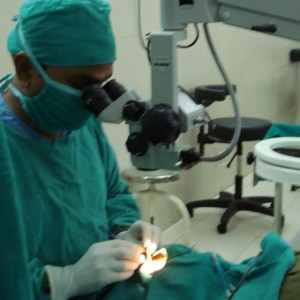
Of the 37 million people across the globe who are blind, over 15 million are from India. 85% of this blind population lives in rural areas where there is lack of health services, unawareness and poor sanitation.
85% of the blindness could be avoided with a simple surgery restoring eyesight, thus restoring life.
To provide high quality eye care services, NBJK started Loknayak Jaiprakash (LNJP) eye hospitals at Hazaribag, Deoghar, Dumka districts of Jharkhand and Gaya district of Bihar. LNJP eye hospitals provide diagnosis and treatment to all types of eye problems like Cataract, Glaucoma, Ptosis, Diabetic Retinopathy, Medical and Surgical Retina, etc at highly subsidised cost. Poor patients who are unable to pay for the service, free services are provided. Through all the four eye hospitals we are treating over 3 lakh people every year in the OPD and restoring sight of about 30,000 people through cataract and other surgeries. These figures are highest for any eye hospital in Jharkhand.
The eye hospitals are supported by Aditya Birla Capital Ltd. and it’s different units , Airport Authority of India , BHEL , CBM , Damodar Valley Corporation (DVC) , DBCS , Give India , Global Giving , HelpAge India , HelpYourNGO , Jamnalal Bajaj Trust , Mission for Vision , Mukul Madhav Foundation Finolex CSR , N M Budhrani Trust , NTPC and ONGC through Anugrha Drishti Daan , Sankara Eye Foundation , SBI Foundation , Second Sight , Seva Foundation , Sightsavers , State Bank of India , Vision 2020 Australia , VMA-NNN-Chaitnyapur , World Diabetes Foundation , and Other donors.
We run Vision Centres in different districts of Bihar and Jharkhand to provide easy and accessible primary eye care services to the rural population. Patients with surgical needs at the Vision Centres are referred to our nearest base hospital for treatment.
Two pioneers in the field of eye care – Aravind Eye Hospital (Madurai) and NNN Vivekananda Ashrama (Chaitanyapur, Kolkata) have provided training & orientation support to doctors and staffs of LNJPEH.
What is the need?
India is having the world’s largest number of blind people. Of the 37 million people across the globe who are blind, over 15 million are from India. 85% of this blind population lives in rural areas where there is lack of health services, unawareness and poor sanitation.
4 out of 5 people those who are blind, don’t have to be, if proper treatment would be provided at right time. Cataract is the major cause of blindness which can be cured with simple surgery restoring the life of that person. But due to lack of awareness and unable to visit hospital for check-ups, poor people living in villages lose their eyesight.
According to WHO, more that 68,000 of new cataract blindness is registered every year in Jharkhand state of India alone. With countable eye hospitals providing services for poor and pity condition of government hospitals, the situation become alarming.
Our Approach and Achievements
NBJK started Loknayak Jaiprakash Eye Hospital (LNJP) with the objective to provide high quality affordable services at free/affordable cost to poor and marginalised people. Currently there are four LNJP eye hospitals. LNJP Eye hospital, Hazaribag is a 120 bedded eye hospital, Dumka is 30 bedded, Deoghar is 30 bedded and and LNJP Eye Hospital, Gaya is a 80 bedded eye hospital. These hospitals are catering to over 20 million population of Bihar and Jharkhand states of India.
The hospital is providing check-up and treatment for almost all types of eye problems like cataract surgery, glaucoma, diabetic retinopathy, Ptosis, squint, etc.
To reach the poor and marginalised living in remote areas, weekly camps are done to diagnose people with eye problems. People diagnosed with cataract are brought to the hospital, operated and again send back to the villages.
Still much to do…
- Cataract Surgical Coverage is one of the indicators to measure the availability of eye health in an area. CSC (VA<6/18) of Jharkhand is 56.2% while of Bihar is 64.4%, while the national average is of 74%
- 85% of cases are curable, but poor people are losing their eyesight in absence of proper medical facility at village level.
- Most affected at rural, and tribal community.
Mental Health
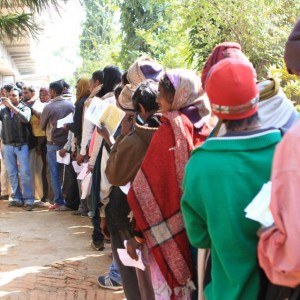
Mental health would comprise of 15% of global disease burden by 2020. Due to fast changing lifestyle, poverty, unemployment, etc. there is a substantial rise in the number of mental illness in rural areas.
It is estimated that 7% of population suffers from mental disorder, of which 90% remains untreated. Many patients of mental illness are treated inhumanly in villages and at their home.
Through the support of BFW-Germany, we were able to reach 13,260 people with mental illness and epilepsy during the year 2015-16 in 40 health camps with support of Ranchi Institute of Neuro Psychiatry & Allied Sciences (RINPAS), Kanke, Ranchi.
NBJK is promoting Carers of mentally ill/epileptic people also in groups and federations in 5 blocks of Hazaribag district with support of Carers Worldwide, UK. Their SHGs are being supported for livelihood, rights advocacy and convergence with government schemes.
What is the need?
Mental health is an issue that is often not addressed, due to stigma and lack of awareness.
With the population increase, changing values, life-style, frequent disruptions in income, crop failure, natural calamity (drought and flood), economic crisis, unemployment, lack of social support and increasing insecurity, there is a substantial increase in the number of people suffering from mental ill-ness in rural areas.
In India where 33.5% of people live below the national poverty line, most poor people with mental disorders cannot access treatment (World Bank, 2008). Over 75% of the population resides in rural areas, while the few psychiatrists (2 per 1 million people) are located in cities/towns.
About 7% of population suffers from mental disorder of which 90% remain untreated.
Problem multiplies in rural areas due to unawareness. Many people refuse to visit Psychiatrist and trust more on faith healers, until the situation become worse. It is also not very uncommon to find people locked/chained at their home for many years due to their mental health issues.
Our Approach and Achievements
NBJK is one of the most renowned organisations of Bihar and Jharkhand states of India, working for past 43 years at the grass root level.
Through the support of BFW-Germany, NBJK could be able to reach 13,260 people with mental illness and epilepsy during the year 2015-16 in 40 health camps with support of Ranchi Institute of Neuro Psychiatry & Allied Sciences (RINPAS), Kanke, Ranchi.
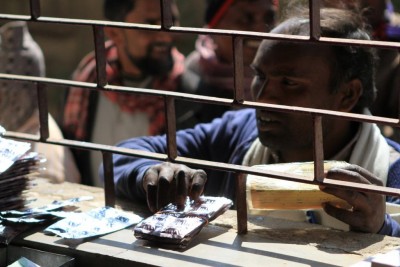
Family Member of patient collecting medicine
Still much to do…
- It has been estimated that mental health would comprise of 15% of global disease burden by 2020
- Patients with mental illness are treated inhumanly in villages
- Fast change in lifestyle has resulted in drastic increase in the number of cases of mental disorders
- There is only one treatment centre for a case load of approximately 4 million
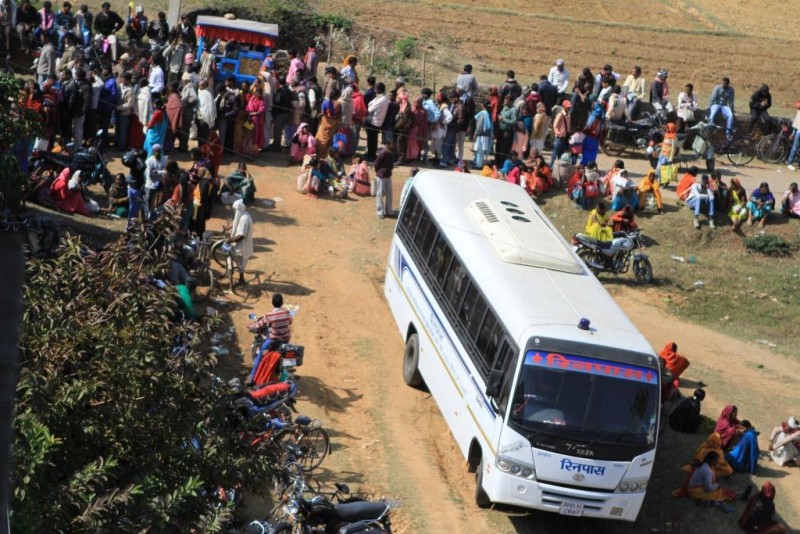
People gathered for treatment and collecting medicine for Mental Illness
Disability
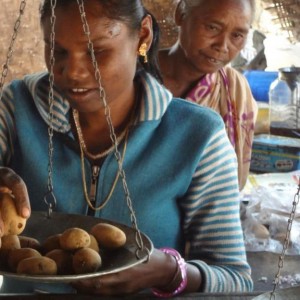
15% of the world’s population lives with some form of disability, this make it to 1 billion people in the world. People with disabilities are double disadvantaged due to poverty and disability. They are considered as burden in the family and society and are subjected to taunting, abuse and isolation.
NBJK with the kind support of organizations like CBM-Australian Aid, Sightsavers, AVI-BLF, Axis Bank Foundation, Sense International, Carers Worldwide, Birla Sunlife Insurance has been able to reach 54000 people with disabilities and facilitated 2778 to access entitlements like certification, pension, railway pass, school enrollment, aids & appliances. 322 children with disabilities were provided home based services like physiotherapy, sign language/speech therapy, orientation & mobility, activities of daily living, nutritional food, training to parents etc.
NBJK is promoting Carers (mostly women in families) of physically/mentally challenged people and works with 854 listed carers organized as 59 SHGs and 4 clusters. These carers are organized as a community and raise voice for livelihood support, recognition as well as convergence with government schemes. NBJK supports person with disabilities to help them. Person with disabilities are organized in 238 DSHGs/Disabled People’s Self-Help Groups (18 with bank linkage), 5 DPOs/Disables People’s Organizations and promoted them to form a powerful disability rights group in Jharkhand and Bihar states of India. Vocational training, placement and self-employment support and other rehabilitation services are provided for the rehabilitation and inclusion of people with disabilities in the society.
What is the need?
World Health Organization estimates that about 15% of the world’s population lives with some form of disability, of whom 2-4% experience significant functional difficulties. Person with disability are among poorest of the poor. It is a proven fact that disability leads to poverty and poverty leads to disability, thus forming a vicious cycle which can only be breached unless external support is provided. In villages, disables are considered as burden in the family & community and are socially excluded. They are termed as cursed person and are forced to live life in isolation, isolated from even basic human rights. They are subjected to taunting life time and are often depressed. But, if person with disability are provide proper training and support they can live a happy life with dignity.
Our Approach and Achievements
NBJK is one of the most renowned organisations of Bihar and Jharkhand states of India, working for past 45 years at the grassroot level. NBJK puts its stake in rehabilitation for PWDs with various service delivery and advocacy at all levels. With the support from organisations like CBM-Australian Aid, Sightsavers, AVI-BLF, Axis Bank Foundation, Sense International, Carers Worldwide, Birla Sunlife Insurance, NBJK was able to reach over 54000 people and children with disabilities.
93 deafblind & multi-sensory impaired children in the villages are provided training on communication, sensory awareness, and functional reading-writing with other skills through home visits by trained Community Based Rehabilitation (CBR) workers.
NBJK provides home based physiotherapy, activity of daily living training, vocational training, Home Based Education and advocacy support to get government benefits to the people and children with Intellectual Disability, Locomotor Disability, Visual Impairment, Blindness and Hearing Impaired. More than 101 people/children with disabilities have got supportive devices, artificial limbs and nutritional supplement for malnourished children. Likewise, 2778 Person with Disabilities could make an access to their rights as per Person with disability Act, 1995 and benefitted in terms of their entitlements through a massive campaign for Certification, Pensions and Railway Passes.
Following projects are currently being implemented under Disability rehabilitation:
- Disability rights in Bihar and Jharkhand (Since 2015, with support of AVI-BLF, U.K.)
- Services for Deafblind Children (Since 2010, with support of Sense India, Ahmedabad)
- Promoting Carers of Physically/Mentally Challenged People (Since 2013, with support of Carers worldwide, U.K.)
- Community Based Rehabilitation for PwDs (Since 2012, with CBM-AusAid & DFAT)
Nothing about us, without us
NBJK believes in helping people with disabilities to help them. Person with disabilities are organized by forming DPOs (Disabled People’s Organizations) and SHGs (Self Help Groups) to strengthen their cause. About 1000 person with disabilities are part of this group, making it one of the strongest Disability Rights Group in Jharkhand.
Still much to do…
Although there has been a lot improvement in one decade in the life of person with disabilities and many are now living a life with dignity, still there is much to do:
- Person with disabilities are double disadvantaged due to poverty and disability
- There is an extreme of lack of awareness about disabilities issues among Tribal Community, General Population and Government officials
- Person with disabilities are most vulnerable toward denial of human rights, abuse and are socially excluded.
- 15 people out of 100 have some form of disability. Every day we see thousands of people. How many people with disabilities we see? We need to bring them back to society from isolation.
MISSION SAHYOG
Improve the livelihoods of people with disabilities in Ranchi District – Jharkhand.
In 2018 Mission Sahyog was implemented. Enabling Units have been established in each block of Ranchi. The Enabling Units support people with all range of disabilities. They are often not aware of and unable to take advantage of available government schemes and entitlements to support their day-to-day lives.
Service offerings
– Understanding of Disability Rights
– Advocacy & Issue Resolution
– Counseling Support & Advisement
– Universal Disability ID Card Assistance
– Linking to Government Schemes
– Fundraising for Aids & Appliances
– Help Completing Benefit Applications
– Linking to Vocational Training
– Access to Skill Development Programs
– Connection to Employment Opportunities
– Support with Marketing/Selling Products
– Loan & Income Generation Services
– Business & Entrepreneur Mentorship
– Referral Services for Eye Surgery
Accomplishments in 2018
-
A total of 2490 people with disabilities were linked with government services and entitlement across the project period.
-
200 disabled youth were enrolled in skill development programs
-
Further on, out of the 100 disabled youths targeted to be employed in the local markets and small scale companies, 47 were identified, prepared for interviews and were linked to the respective jobs.
-
A total of 125 PwDs were mentored and supported to prepare their business plans and start/improve/expand their entrepreneurial ventures. They have been awarded with a grant of INR 5000.
Watch our movies on the Sahyog Project!
For more information on Mission Sahyog and what you can do to support this cause
or to discuss potential employment opportunities, please contact us.

